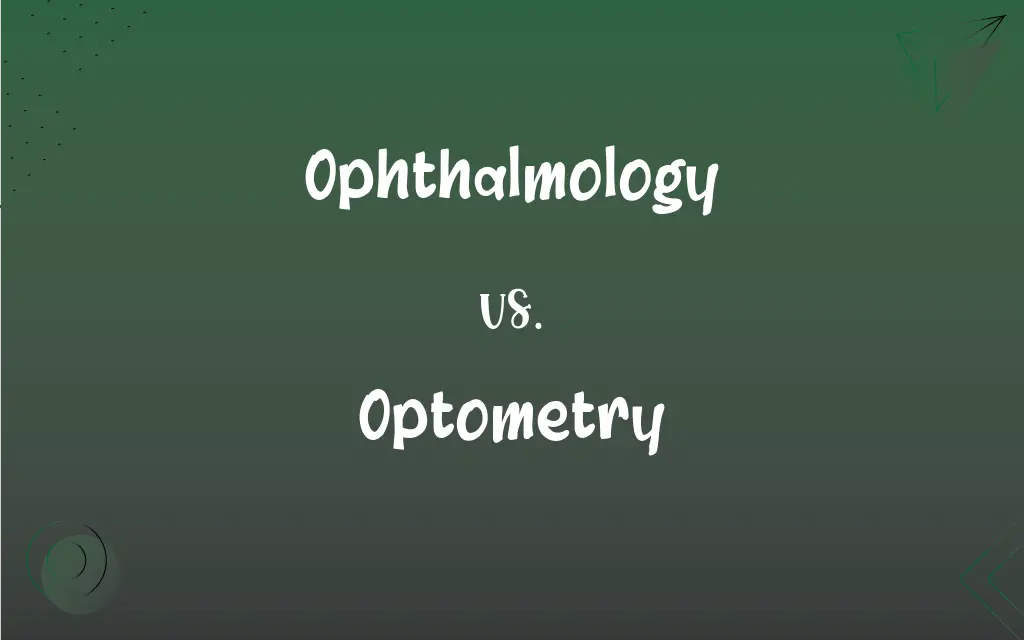Ophthalmology vs. Optometry: What's the Difference?
Edited by Aimie Carlson || By Janet White || Published on January 2, 2024
Ophthalmology is the medical field focused on eye diseases, surgery, and treatment, while optometry primarily involves vision care, eye exams, and prescribing corrective lenses.

Key Differences
Ophthalmology is a branch of medicine dealing with the diagnosis and treatment of eye disorders, including surgical interventions. Optometry, on the other hand, focuses on examining eyes for vision and health problems and prescribing eyeglasses or contact lenses.
An ophthalmologist is a medical doctor specializing in eye and vision care, capable of performing eye surgery. In contrast, an optometrist is not a medical doctor but a healthcare professional qualified to diagnose and treat vision issues.
Ophthalmology includes advanced medical treatment for eye diseases like glaucoma, cataracts, and retinal disorders. Optometry primarily deals with vision correction, eye exams, and the detection of eye abnormalities.
Training for ophthalmologists involves medical school, followed by a residency in ophthalmology. Optometrists, however, complete a Doctor of Optometry (OD) degree, which does not include general medical training.
Ophthalmologists often manage complex eye diseases and can perform surgeries like LASIK or cataract removal. Optometrists focus on primary eye care, including vision tests, prescribing glasses, and identifying eye conditions.
ADVERTISEMENT
Comparison Chart
Professional Qualification
Medical doctor (MD or DO)
Doctor of Optometry (OD)
Scope of Practice
Diagnosis and treatment of eye diseases; surgery
Vision care, eye exams, prescribing lenses
Surgical Privileges
Can perform eye surgeries
Cannot perform surgeries
Medical Training
Completes medical school and residency
Completes optometry program
Focus Area
Comprehensive eye care and complex conditions
Primary eye care and vision correction
ADVERTISEMENT
Ophthalmology and Optometry Definitions
Ophthalmology
Ophthalmology is the medical specialty concerned with the eye and its diseases.
She consulted an ophthalmologist for her persistent eye irritation.
Optometry
Optometry is the healthcare field focusing on vision care and eye health.
She visited the optometrist for a routine eye exam.
Ophthalmology
Ophthalmology includes the study of eye anatomy, physiology, and diseases.
Recent research in ophthalmology has led to new treatments for glaucoma.
Optometry
Optometrists prescribe eyeglasses and contact lenses to correct vision.
The optometrist updated her prescription for contact lenses.
Ophthalmology
Ophthalmologists are trained to perform eye surgeries.
An ophthalmologist performed her LASIK surgery to correct her vision.
Optometry
Optometrists perform eye tests to detect eye diseases and conditions.
During the optometry visit, he was diagnosed with early-stage cataracts.
Ophthalmology
Ophthalmology covers the comprehensive medical care of the eye.
He specializes in pediatric ophthalmology, treating eye conditions in children.
Optometry
Optometry involves diagnosing and managing vision changes.
Optometry today includes the use of advanced technology for eye examinations.
Ophthalmology
Ophthalmology involves both medical and surgical eye treatment.
The advancements in ophthalmology have improved cataract surgery techniques.
Optometry
Optometry emphasizes primary eye care and maintenance of eye health.
The field of optometry has expanded to include dry eye treatment and management.
Ophthalmology
The branch of medicine that deals with the diagnosis and treatment of diseases and disorders of the eye.
Optometry
The practice or profession of an optometrist.
Ophthalmology
(medicine) The anatomy, functions, pathology, and treatment of the eye.
Optometry
The art and science of vision and eye care.
Ophthalmology
The science which treats of the structure, functions, and diseases of the eye.
Optometry
Measurement of the range of vision, esp. by means of the optometer.
Ophthalmology
The branch of medicine concerned with the eye and its diseases
Optometry
As defined (with minor variations) in the statutes of various States of the United States:
Optometry
The practice of an optometrist
FAQs
What is ophthalmology?
It's a medical field focused on diagnosing, treating, and preventing eye diseases.
Can ophthalmologists perform surgery?
Yes, ophthalmologists are trained to perform eye surgeries.
What type of education do ophthalmologists have?
Ophthalmologists complete medical school and a residency in ophthalmology.
What is the educational background of an optometrist?
Optometrists earn a Doctor of Optometry (OD) degree, which is not a medical degree.
When should someone visit an optometrist?
For regular eye exams, prescription updates for glasses or contacts, and minor eye issues.
What is optometry?
Optometry is a healthcare profession that specializes in eye and vision care, including prescribing glasses and contacts.
Can ophthalmologists prescribe glasses and contact lenses?
Yes, ophthalmologists can prescribe corrective lenses.
Is optometry considered a medical field?
It's a healthcare field but not a branch of medicine like ophthalmology.
Can optometrists perform eye surgeries?
No, optometrists are not trained or licensed to perform eye surgeries.
Do ophthalmologists treat eye diseases?
Yes, they diagnose and treat a wide range of eye diseases.
What services do optometrists provide?
Optometrists provide primary vision care, including vision testing and correction.
What kind of eye problems require an ophthalmologist?
Complex or serious eye conditions like cataracts, glaucoma, or retinal diseases.
Can an ophthalmologist provide regular eye exams?
Yes, but they typically focus on more complex eye issues.
What are common procedures performed by ophthalmologists?
Eye surgeries like cataract removal, LASIK, and treatments for retinal disorders.
How often should you see an optometrist?
Generally, it's recommended to have an eye exam every 1-2 years, depending on your age and eye health.
What distinguishes ophthalmology from optometry in patient care?
Ophthalmology deals with more complex medical and surgical care, while optometry focuses on primary vision care and correction.
Can ophthalmologists treat eye injuries?
Yes, they are equipped to handle eye emergencies and injuries.
Are optometrists qualified to detect eye diseases?
Yes, they can detect various eye conditions and diseases during routine exams.
Do optometrists manage chronic eye diseases?
They can manage some chronic conditions but often refer more complex cases to ophthalmologists.
Do optometrists and ophthalmologists work together?
Yes, they often collaborate to provide comprehensive eye care.
About Author
Written by
Janet WhiteJanet White has been an esteemed writer and blogger for Difference Wiki. Holding a Master's degree in Science and Medical Journalism from the prestigious Boston University, she has consistently demonstrated her expertise and passion for her field. When she's not immersed in her work, Janet relishes her time exercising, delving into a good book, and cherishing moments with friends and family.
Edited by
Aimie CarlsonAimie Carlson, holding a master's degree in English literature, is a fervent English language enthusiast. She lends her writing talents to Difference Wiki, a prominent website that specializes in comparisons, offering readers insightful analyses that both captivate and inform.






































































